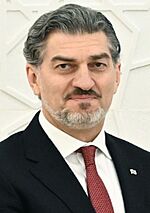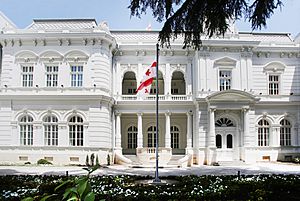President of Georgia facts for kids
Quick facts for kids President of Georgiaსაქართველოს პრეზიდენტი |
|
|---|---|
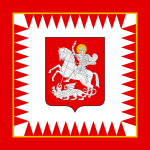
Presidential standard
|
|
| Office of the President of Georgia | |
| Residence | Orbeliani Palace (since Nov 2018) |
| Appointer | Georgian Electoral Assembly |
| Term length | Five years,
renewable once
|
| Constituting instrument | Constitution of Georgia (1995) |
| Inaugural holder | Zviad Gamsakhurdia |
| Formation | 14 April 1991 |
| Deputy | Chairperson of the Parliament |
| Salary | 13,000 GEL (€4,500) per month |
The President of Georgia (Georgian: საქართველოს პრეზიდენტი, romanized: sakartvelos p'rezident'i) is like the main representative of the country. They are the head of state and the commander-in-chief of Georgia's military. The country's rulebook, the Constitution, says the president makes sure Georgia stays united and independent.
In Georgia, the president mostly has a symbolic role, similar to a figurehead in many countries with a parliamentary democracy. This means the main power to run the government is with the Prime Minister and the Government. However, the president still has some important duties, like being able to pardon people who have been found guilty of crimes. The job of president was first created on April 14, 1991, shortly after Georgia declared its independence from the Soviet Union. A president serves for five years.
On December 14, 2024, the Georgian Electoral Assembly chose Mikheil Kavelashvili as the new president. He officially started his job on December 29, 2024. This was the first time Georgia's president was chosen indirectly, meaning not by a direct vote from all citizens. This change happened because of new rules added to the Constitution in 2017. Some political groups and experts in Georgia, along with parts of the international community, believe that Kavelashvili's presidency is not fully legitimate. They think that Salome Zourabichvili is still the rightful president.
Contents
- Who Can Be President?
- How the President Is Chosen
- Removing the President from Office
- What the President Does
- Taking the Oath
- Presidential Protection
- The Presidential Standard
- A Look at Presidential History
- What Happens if the President Can't Serve?
- Presidential Administration
- List of Presidents
- Timeline of Presidents
- See also
Who Can Be President?
To become the President of Georgia, a person must be a citizen of Georgia and have the right to vote. They also need to be at least 35 years old and have lived in Georgia for at least 15 years. Someone who is also a citizen of another country cannot be the President of Georgia. Also, the president cannot be a member of any political party while in office.
How the President Is Chosen
Since 2024, the president is chosen for a five-year term by a special group called the Electoral College. This group has 300 members. It includes all members of the Parliament of Georgia, members from the main governing bodies of the regions of Abkhazia and Adjara, and members from local governments. A person can only be elected president twice. At least 30 members of the Electoral College must agree to nominate someone to be a candidate for president. The Parliament sets the presidential election for October.
Removing the President from Office
Members of Parliament can start a process to remove the president from office, which is called impeachment. At least one-third of all Parliament members must agree to start this process. For the president to be removed, at least two-thirds of the Parliament members must vote for it. This impeachment process cannot happen if the country is in a state of emergency or under martial law.
What the President Does
The President of Georgia has several important jobs and powers:
- They represent Georgia in other countries and with international groups, with the government's approval. They can talk with other nations, sign international agreements, and welcome ambassadors from other countries. They also appoint and remove Georgia's own ambassadors.
- They can sign special agreements with the main church of Georgia, the Apostolic Autocephalous Orthodox Church.
- They announce when elections for Parliament and local governments will happen.
- They appoint and remove the leader of Georgia's military, with the government's approval. They also appoint one member to the High Council of Justice. They help choose the chairperson and members of the Central Election Commission. They also suggest candidates for national regulatory bodies to Parliament, based on government nominations.
- They make decisions about who can become a citizen of Georgia.
- They can pardon people who have been found guilty of crimes.
- They give out state awards, military ranks, and special titles.
- They can temporarily stop or even close down a local government body if its actions threaten the country's independence or unity, or if they stop state bodies from doing their jobs. This needs a recommendation from the government and approval from Parliament.
- They also have other duties listed in the Constitution.
The President can also ask for a referendum, which is a public vote on important issues. This can happen if Parliament, the Government, or at least 200,000 voters ask for it. A referendum cannot be used to pass or cancel laws, grant pardons, approve or cancel international agreements, or limit basic human rights.
The President also has the right to speak to the people of Georgia. Every year, the president gives a report to Parliament about important issues facing the country.
Taking the Oath
Before starting their job, the new President of Georgia takes an oath. This happens on the third Sunday after the election. The oath is a promise to the country and its people.
Presidential Protection
The President of Georgia has special protection and cannot be arrested or charged with a crime while in office. The Special State Protection Service is in charge of keeping the president safe.
The Presidential Standard
The presidential standard is a special flag. It looks like the national flag of Georgia, but it has the Georgian coat of arms in the middle. Copies of this flag are used in the president's office, at government buildings, and on cars carrying the president within Georgia.
A Look at Presidential History
After Georgia became independent from the Soviet Union on April 9, 1991, the Supreme Council decided to create the job of executive president on April 14. They appointed Zviad Gamsakhurdia to this role until a public election could be held. On May 26, 1991, Gamsakhurdia won by a lot of votes, becoming Georgia's first president. However, he was removed from power in a military coup on January 6, 1992. He continued to act as president from outside the country until he died on December 31, 1993, during an attempt to get his power back.
After the coup, there was no clear leader. So, on March 10, 1992, a new position called "head of state" was created for Georgia's new leader, Eduard Shevardnadze. When a new Constitution was approved on August 24, 1995, the job of president was brought back. Shevardnadze was elected president on November 5, 1995, and again on April 9, 2000. He resigned on November 23, 2003, because of large public protests known as the Rose Revolution. After Nino Burjanadze briefly served as an acting president, Mikheil Saakashvili was elected on January 4, 2004. He resigned early on November 25, 2007, to help calm tensions after protests. He was re-elected on January 20, 2008.
Between 2013 and 2018, new rules were added to the Constitution. These rules gave more power to the prime minister and the government, and less to the president. After Giorgi Margvelashvili became president in October 2013, Georgia officially became a parliamentary republic. This means the prime minister and parliament have most of the power. In November 2018, Salome Zourabichvili became Georgia's first female president. According to the new Constitution, she was the last president to be chosen by a direct vote from the people.
Recent Presidential Dispute
On February 13, 2025, the European Parliament passed a resolution. This resolution stated that the European Union does not recognize Mikheil Kavelashvili as the legitimate president of Georgia.
What Happens if the President Can't Serve?
If the president resigns, dies, or is removed from office, the Chairperson of Parliament temporarily takes over as president. They serve until a new president can be elected. This happened in Georgia in 2003 and 2007. In both cases, the president resigned early, and the Chairperson of Parliament, Nino Burjanadze, became the acting president. She was the first woman to serve as acting president. However, Salome Zourabichvili was the first woman to be officially elected president by the people.
Presidential Administration
| Georgian: საქართველოს პრეზიდენტის ადმინისტრაცია | |

Logo of the Administration featuring Orbeliani Palace
|
|
| Agency overview | |
|---|---|
| Formed | February 14, 2004 |
| Headquarters | Orbeliani Palace, Tbilisi |
| Agency executive |
|
The Administration of the President of Georgia (Georgian: საქართველოს პრეზიდენტის ადმინისტრაცია, romanized: sakartvelos p'rezident'is administ'ratsia) is a group that helps the President do their job. It supports and organizes all the tasks and powers given to the President by the Constitution and other laws. This Administration was created on February 14, 2004, by a decision from President Mikheil Saakashvili. It follows the Constitution and other laws of Georgia. The President decides how the Administration is set up and how it works.
List of Presidents
Presidents of Georgia
| No. | Name (Born–Died) |
Picture | Started Office | Left Office | Time in Office | Party | Election |
|---|---|---|---|---|---|---|---|
| 1 | Zviad Gamsakhurdia (1939–1993) |
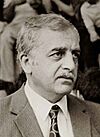 |
April 14, 1991 | January 6, 1992 (Removed from power) |
267 days | Round Table—Free Georgia | 1991 |
| The president's office was empty from January 6, 1992, to November 26, 1995. | |||||||
| 2 | Eduard Shevardnadze (1928–2014) |
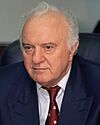 |
November 26, 1995 | November 23, 2003 (Forced to resign) |
7 years, 362 days | Union of Citizens of Georgia | 1995
2000 |
| — | Nino Burjanadze (b. 1964) Acting |
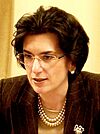 |
November 23, 2003 | January 25, 2004 | 63 days | United National Movement | – |
| 3 | Mikheil Saakashvili (b. 1967) |
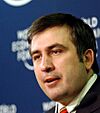 |
January 25, 2004 | November 25, 2007 (Resigned) |
3 years, 304 days | United National Movement | 2004 |
| — | Nino Burjanadze (b. 1964) Acting |
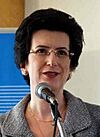 |
November 25, 2007 | January 20, 2008 | 56 days | United National Movement | – |
| (3) | Mikheil Saakashvili (b. 1967) |
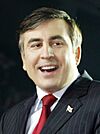 |
January 20, 2008 | November 17, 2013 | 5 years, 301 days | United National Movement | 2008 |
| 4 | Giorgi Margvelashvili (b. 1969) |
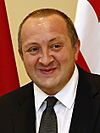 |
November 17, 2013 | December 16, 2018 | 5 years, 29 days | Georgian Dream | 2013 |
| 5 | Salome Zourabichvili (b. 1952) |
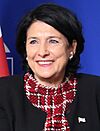 |
December 16, 2018 | December 29, 2024 | 6 years, 13 days | Independent | 2018 |
| Incumbent (Disputed) |
7 years, 74 days (Disputed) |
||||||
| 6 | Mikheil Kavelashvili
(b. 1971) |
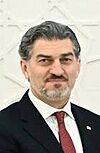 |
December 29, 2024 | Incumbent (Disputed) |
1 year, 61 days (Disputed) |
People's Power | 2024 |
Chairman of the Supreme Council
| No. | Name (Born–Died) |
Picture | Started Office | Left Office | Time in Office | Party | Legislature | Election |
|---|---|---|---|---|---|---|---|---|
| 1 | Zviad Gamsakhurdia (1939–1993) |
 |
November 14, 1990 | April 14, 1991 | 151 days | Round Table—Free Georgia | Supreme Council | 1990 |
Interim Heads of State (1992–1995)
| No. | Name (Born–Died) |
Picture | Started Office | Left Office | Time in Office | Party | Title |
|---|---|---|---|---|---|---|---|
| — | Jaba Ioseliani (1926–2003) |
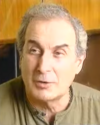 |
January 6, 1992 | March 10, 1992 | 64 days | Mkhedrioni | Co-chairmen of the Military Council |
| Tengiz Kitovani (1938–2023) |
 |
National Guard | |||||
| — | Eduard Shevardnadze (1928–2014) |
 |
March 10, 1992 | November 4, 1992 | 239 days | Independent | Chairman of the State Council |
| November 4, 1992 | November 6, 1992 | 2 days | Chairman of the Parliament | ||||
| November 6, 1992 | November 26, 1995 | 3 years, 20 days | Head of State |
President in Dissidence (1993)
| No. | Name (Born–Died) |
Picture | Started Office | Left Office | Time in Office | Party |
|---|---|---|---|---|---|---|
| — | Zviad Gamsakhurdia (1939–1993) |
 |
September 24, 1993 | November 6, 1993 | 43 days | Round Table—Free Georgia |
Timeline of Presidents
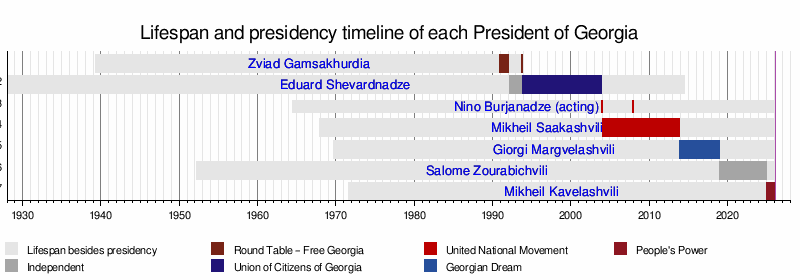
See also
 In Spanish: Presidente de Georgia para niños
In Spanish: Presidente de Georgia para niños
 | Bayard Rustin |
 | Jeannette Carter |
 | Jeremiah A. Brown |


